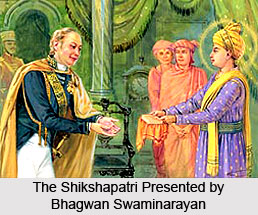 Shikshapatri has been written by saint Swaminarayan in Sanskrit. He wrote it on the 5th day of bright half of Maha of Samvat year 1882, at Vadtal. Shikshapatri is a small book that includes 212 verses in Anustup Chhand. The teachings of Shikshaparti are meant for the education and discipline of the monks who had joined the sect. it is equally beneficial for the common masses also. It is said that one who sincerely follows the verses of Shikshapatri would become happy and prosperous in this life. It describes elaborately the duties of the disciples, Acharyas, Tyagis, Gruhasthas and females. They are considered to be inviolable and the basis of truth by the followers of the sect. The 212 Sanskrit verses that set down the do`s and don`ts on a wide range of topics.
Shikshapatri has been written by saint Swaminarayan in Sanskrit. He wrote it on the 5th day of bright half of Maha of Samvat year 1882, at Vadtal. Shikshapatri is a small book that includes 212 verses in Anustup Chhand. The teachings of Shikshaparti are meant for the education and discipline of the monks who had joined the sect. it is equally beneficial for the common masses also. It is said that one who sincerely follows the verses of Shikshapatri would become happy and prosperous in this life. It describes elaborately the duties of the disciples, Acharyas, Tyagis, Gruhasthas and females. They are considered to be inviolable and the basis of truth by the followers of the sect. The 212 Sanskrit verses that set down the do`s and don`ts on a wide range of topics.
Shikshapatri means Hit-tam Updesh. The term Hit-tam signifies ultimate real well-being in life here and in life here-after. The book is treated as direct orders from the Swaminarayan by his disciples.
They follow the dictates as coming directly from the Divine personality of Lord Swaminarayan. They imbibe the dictates in their daily life hence their actions become devoid of ego and selfishness and therefore are all Bhaktimaya and Nirgun.
1. Not to kill intentionally any living creature including insects and bugs.
2. To observe the rules of ethics without fail
3. Not to sacrifice animals in rituals
4. Not to commit homicide
5. Not to commit suicide even in a holy place
6. Not to eat meat unless there is an extreme necessity
7. Not to mutilate any part of one`s body
8. Not to commit theft
9. Not to indulge in vice such as gambling, adultery, drinking wine or other
ntoxicating drinks.
10. Not to make false accusations
11. Pay respect to deities in the temples
12. To follow the varnashrama dharma faithfully.
13. Not to speak any truth that may harm oneself or others
14. Not to associate oneself with thieves, wicked people and sinners
15. Not to make or take medicine which contain alcohol or meat.
16. Male disciples should never listen to discourses given by females.
17. Not to go empty handed to a guru, deity or king.
18. Not to wear clothes that would expose one`s body indecently.
19. To stay away from the opposite sex inside a temple
20. Different marks and symbols for followers of different castes.
Shikshapatri tries to cover social, civil, educational, political, religious, philosophical, all aspects of life. It is a practical encyclopedia and ready spiritual reference for all the common people.




















